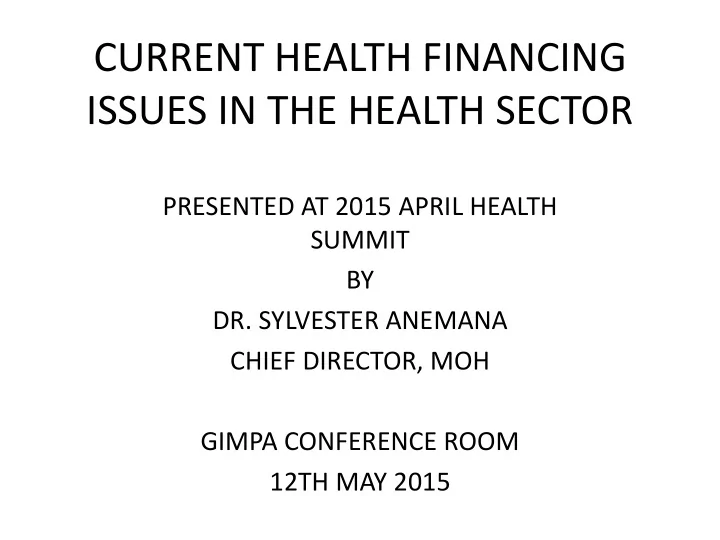

CURRENT HEALTH FINANCING ISSUES IN THE HEALTH SECTOR PRESENTED AT 2015 APRIL HEALTH SUMMIT BY DR. SYLVESTER ANEMANA CHIEF DIRECTOR, MOH GIMPA CONFERENCE ROOM 12TH MAY 2015
OUTLINE 1. Sources of financing 2. Donors leaving sector budget support to earmark funding 3. Effect of MDBS on MDAs 4. Ghana is now a middle income country 5. *Off budget expenditure (Fiscal budget discipline) 6. Generation and use of IGF 7. Management of program funds
OUTLINE CONT. 7. Delays in claims reimbursement 8. Cost containment and efficiency gains 9. Managing the HR budget 10.Financing the capital investment plan – Equipment, civil works etc – Recurrent cost of investment
SOURCES OF FINANCING TO SECTOR (2015) • GOG – appropriation from Parliament (1.34 Billion GHS) • GOG – NHIS Allocation Formula (1.4 Billion GHC) • GOG – IGF (One Billion GHC) • GOG- Loans and M/C (575 million GHC) • Donor – SBS, Earmarked Funds (712.8 Million GHC) • Overall Total- 4.456 Billion GHC
DONORS LEAVING SECTOR BUDGET SUPPORT TO EARMARK FUNDING • Over the last three years all key budget support partners (except JICA) have moved to earmark funding. – As a result; • Major health sector priorities are not funded • Some donors leaving the Ghana health sector
EFFECT OF MDBS ON MDAs • MDBS DPs linking sector disbursement to macro level indicators – This creates delays in disbursement of funds to the sector (e.g. MAF)
GHANA IS NOW A MIDDLE INCOME COUNTRY • Since Ghana became a middle income country, some DPs and Global Health Initiatives have given indications of graduating their support to Ghana. For example Gavi Alliance have started developing a graduation plan with Ghana for vaccines. – Ghana would have to finance huge investment and commitments after graduation
OFF BUDGET EXPENDITURE (FISCAL BUDGET DISCIPLINE • During implementation of the budget, issues come up for which the normal budget did not take care of. Usually government budgeting at MDA level does not allow for contingencies. In some cases there are large over expenditure against budgets for some activities. There seem to be no formal opportunity for reviewing the budget at MDA level – This leaves some of the activities unfunded
GENERATION AND USE OF IGF • There are challenges in the system for IGF forecasting, collection and recording. Non compliance in the use of IGF guidelines. – Inability of the sector to capture the full compliment of IGF generated and used – IGF is not used to support direct service delivery
MANAGEMENT OF PROGRAM FUNDS • Programme funds are used as additional to Government budget. However planning for programmes and programme activities are not well integrated into central budget. – Duplication of activities which may result in Inefficiencies in the use of funds (both programme and GoG)
LIMITED FISCAL SPACE • Government budget allocation to MoH keeps declining • Increasing coverage of NHIS • Within the current financial challenges, government have limited fiscal space. – Increased expenditure on claims payment resulting in deficit financing – Inability to fund health priorities especially health commodities – Challenges in meeting government counterpart support – Delays in reimbursement of claims
MANAGING THE HR BUDGET • The Health Financing strategy proposes short medium to long term solutions which requires major reforms to HR management. • Currently the HR budget takes about 85% of GoG allocation to MoH. – What are the preparations towards improving productivity and reducing the HR budget – What are the preparations towards improving performance through decentralizing HR management – How do we institutionalize a performance management system that is linked to productivity and output
FINANCING THE CAPITAL INVESTMENT PLAN • Each year, MoH develops a well costed capital investment plan. Full implementation has been very slow due to inadequate funding. In the past equipment and civil works have been managed separately. – Inadequate provision of funds for equipment purchases and maintenance – Need to review the management, maintenance and ownership of major equipment procured for hospitals – Weak linkage between investment and recurrent planning for major capital projects during the planning process. Recurrent cost implications from major capital projects becomes a challenge
ADDRESSING THE CHALLENGES • A Health Financing Strategy and Implementation plan have been put in place to address the above mentioned issues
WAY FORWARD • Hold a stakeholder meeting to roll out the plan • There will be individual stakeholders plan • Mobilise resources to finance the plans • Implement • Monitor implementation
CONCLUSION • We need all hands on deck to make this a reality
THANK YOU
Recommend
More recommend